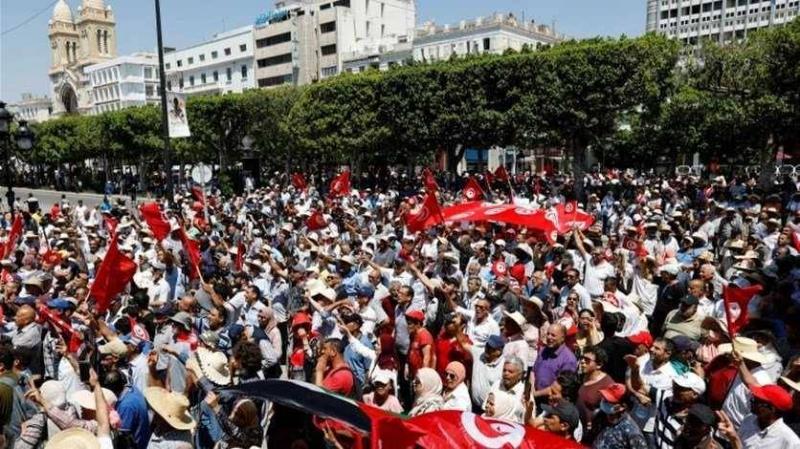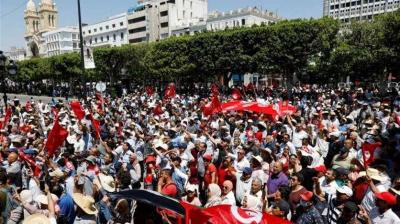Hundreds protested in Tunisia to condemn the proposed constitutional amendment and its submission to a referendum, as well as the dismissal of 57 judges by the president, who has held power for nearly a year. The demonstration was called by the "National Salvation Front," which includes opposition parties such as the Ennahda Movement, to "champion freedom values and defend democratic achievements."
The protesters chanted slogans such as "Constitution of freedom, national dignity," "The people want judicial independence," "Hands off the judiciary," and "Your constitution does not bind us," holding copies of the 2014 Constitution that was established after the "revolution" that ousted former president Zine El Abidine Ben Ali in 2011.
A national dialogue aimed at preparing a draft constitutional amendment began two weeks ago, with President Kais Saied expected to receive the draft on Monday to present it for a popular referendum in about a month. Opposition parties were excluded from participating in the dialogue, and the Tunisian General Labour Union (UGTT) also refused to take part.
Ennahda leader Ali Larayedh told AFP, "This maneuver under the guise of a referendum, constitution, and elections is meaningless and does not lead us anywhere." He added, "The protest against the exclusion of the judiciary and against the coup process on the constitution will not stop, and we will use all legitimate means."
Earlier this June, the Tunisian president strengthened his powers by amending laws governing the High Judicial Council, leading to the dismissal of 57 judges who were accused of "concealing terrorist cases," "corruption," "sexual harassment," and "affiliating with political parties." As a result, judges launched a general strike across all courts in the country that continues and has been extended for a third week.
On July 25, the Tunisian president announced the consolidation of power in the country, the suspension of parliament's work, and its subsequent dissolution, while also dismissing Prime Minister Hichem Mechichi. Saied established a political roadmap beginning with an electronic consultation, planning for a popular referendum on a new constitution on July 25 next year, leading to legislative elections by the end of this year.
Saied's decisions and the approach he is pursuing have faced severe criticism from the Ennahda Party, which has the largest parliamentary bloc, claiming that the president's actions constitute a "coup against the constitution and the revolution," as well as from many local and international NGOs warning of an "authoritarian drift" in Tunisia, which had embarked on a path of democracy after Ben Ali's fall.




